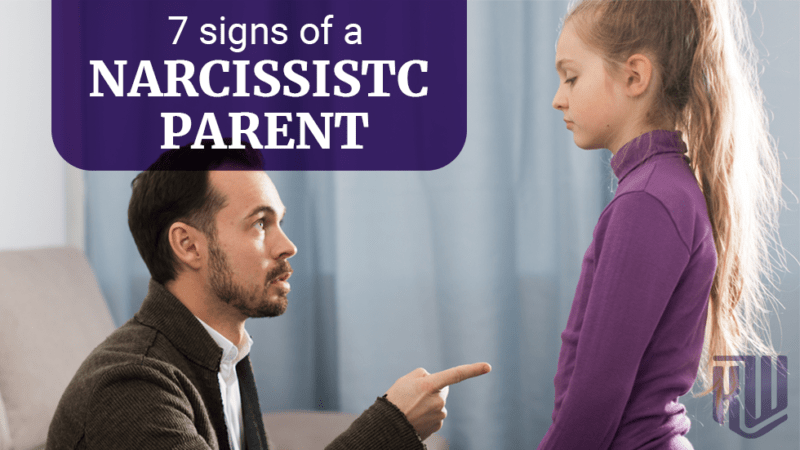Have you always been curious about whether a narcissistic parent raised you? In today’s Best Day Blog article, we will look at the characteristics of a narcissistic parent and how being raised by a narcissistic parent translates into adult life. We’ll also look at what you can do to begin the recovery process to get your life back.
Before continuing, it’s a good idea to check Are They a Narcissist or a Codependent? to understand the difference between a narcissist and a falsely empowered codependent. You wouldn’t have ankle surgery for a broken arm, and you can’t heal from something you don’t struggle with; you want the solutions you are getting to be helpful to you.
These are the characteristics of a narcissistic parent:
1. A narcissist’s child exists to meet the parent’s needs
Whatever is going on, the child is a prop and nothing more. Everything is about the parent.
Many of us have been raised by falsely empowered parents and have moments like that. The difference is that this behavior will be consistent in a narcissist rather than moments as in a falsely empowered codependent.
One of the ways narcissistic parent uses their child is to fulfill their unrealized dreams so they can live vicariously through them. So, the child’s individuality, thoughts, dreams, feelings, desires, needs, and wants are entirely ignored. All of these things are fashioned and controlled and decided by the parent. It all must be to please the parent.
Generally, a narcissistic parent will use a lot of guilt. They may try to stop you from going off on your own, telling you that you don’t care about them because you want to leave them. You, as the child, are always placed in a double bind. If you go and pursue your interests, you feel like you’re letting your parent down. So, your parent is always making these decisions for you.
As a child of a narcissist, you’re treated like an ornament. While the parent pursues their status, career, activities, or promotion of their self-importance through charities or social media, you’re propped up as an ornament. They highlight how well you’re doing in school or your athletic pursuits and how great you make them look. It might even be that only one of their children is highlighted as the ornament while the others are never featured because they aren’t as ‘good’ in the eyes of a narcissist.
Again, many parents may have moments like this, but that doesn’t mean they are narcissists. If this is consistent behavior across time, situation, and activity, that is the signifier for narcissism.
2. The narcissistic parents are always superior and will fight for their superiority
Their children can never eclipse them, which means the parent is always in competition with their child. An example of this could be a parent and child sharing the same hobby or cooking a festive family dinner; the parent will constantly belittle and criticize what the child has done, regardless of their age or talent. This is something that continues into adulthood. The narcissistic parent will always have to be better than their child, irrespective of the actual quality of the parent’s work.
These parents are possessive, competitive, and critical and will constantly compete with your friends and whoever you date or marry. That’s because they feel the need to always be above them. You’ll often see this with people who are new to the family, and your parent is likely to tell you or even your partner that they are not good enough for you. They’re always in a constant state of complaining. A narcissistic parent will try to segregate you from your friends or partners because they need their position of superiority.
3. Narcissistic parents seek external validation
They will parade their accomplishments – their life, trophy husband or wife, trophy kids, trophy associations – in front of others all the time. They seek a ‘better than’ position – ‘this is less than, that is better than.’ Everything is a comparison, and it’s all predicated on external validation. Sharing any personal information that makes them look bad is the worst thing someone could do to them, regardless of how their child’s feelings might be impacted. Parents like this will place themselves in positions where they can be recognized and validated.
4. A narcissistic parent will use shame, blame, manipulation, and coercion
They work to control you and always keep you beneath them. The way you dress, the way you act, or the way you perform is an embarrassment to them all the time. One way they do this is by boasting about how much they’ve done for you. This becomes even more prevalent when you try to move away from home. You can see this in parents who guilt their child for leaving by essentially listing all that they’ve done for them in their life as if it was out of the kindness of their hearts rather than the obligation and legal duty they have for bringing a child into the world. As a parent, it’s their job to take care of their child without expecting anything in return.
Narcissistic parents will often blame their children for their unhappiness. This can extend beyond the parent-child relationships and into the parent’s troubles with their partner or loneliness. These parents will manipulate you with money or vice to get you to do what they want. This might be in the form of paying for rent, bills, and everything else so that their money can control you, especially if they threaten to cut you off as a way to get you to do what they want.
In trying to coerce you into doing something immediately, they might barge into your house unannounced and uninvited. Or they will put you in a position where you need to make a difficult decision to please them and put them in a place of being your priority. If you don’t make them your preference, then they tell you you’re a terrible child.
5. They are rigidly controlling and highly sensitive
This is expressed as the adage, ‘it’s my way or the highway.’ No matter what, you, as a child, are always wrong. Any thought, feeling, action, or belief must always align with them. Any disagreement creates explosiveness. Remember that narcissists have severe shame and tremendously low self-esteem, so they can never be labeled as wrong. Unlike a falsely empowered codependent, a narcissist is never aware of this. Instead, they continuously negate any flaws within themselves.
6. These parents lack empathy
With an inability to register their child’s thoughts or feelings, they can’t understand that the child is inherently meaningful and worth something. That’s that lack of empathy; the only feelings that matter are their own. This is why if you’re having a bad day, they immediately turn the attention towards themselves and how their day was. It is a constant competition for them to be the center of the conversation.
7. A narcissistic parent expects their child to take care of them
This starts in childhood but then extends into adulthood and beyond. It encompasses emotional, physical, and, in many instances, financial care in virtually every area. They want you to put them above even your kids and family. Because, after all, they believe that you owe them something for everything they gave you growing up.
There’s a misconception that we must take care of our parents, but it’s our parents’ job to take care of us and to have worked in a position where they can take care of themselves as they grow old. Life may be difficult, and many parents work hard under circumstances that disallowed them from creating a comfortable nest egg to retire on; that shouldn’t be held against them. However, while children will often have to chip in at the end, parents who aren’t narcissistic will not believe that they deserve to be cared for in this way. With narcissism, parents expect to be cared for even if they can care for themselves.
The common thread within all seven of these characteristics is that narcissistic parents are the mountaintop with everything else revolving around them, not in moments but all the time.
What does this look like in adulthood?
If a narcissist raised you, there are several ways it would manifest as an adult, including low self-esteem, anxiety, or depression. You will be codependent in many or all of your relationships, have poor boundaries, and tend to be a people pleaser. It’s almost impossible for you to say no.
Children of narcissistic parents tend to be racked with chronic guilt if they’ve managed to say no, and they tend to be left with a tremendous feeling of emptiness. They may not feel it or medicate it away, which is why they won’t seek recovery—seeking recovery means feeling that void, and who wants that? This is the biggest struggle for many trying to recover; it can be isolating and intensely lonely. It’s an uncomfortable feeling to make peace with. But this is where the healing is.
A person raised by a narcissist cannot express or even handle their emotions. They can be all over the place and react quickly or shut down and shut off. Trust issues and indecision are often very prevalent as well; they will relinquish decision-making power to others.
Sadly, children of narcissists tend to pick partners who are also narcissistic. You do not end up in a narcissistic adult relationship unless you have suffered severe trauma in childhood. Many people push back on that, but they tend to be detached from the reality of their childhood abuse. Malcolm Gladwell points out that it takes 10,000 hours to become proficient at something. Few of us ever take a class on how to be a parent or have a relationship, but everyone thinks they are an expert. Everyone thinks they know their childhood without delving into it even a little bit. Therefore, everyone has a deep level of disconnect from reality about the truth of their childhoods. If they do the work, they will realize the truth about their parents and their perfect imperfections.
What are the solutions?
1. The first thing is trauma recovery. If you know that a narcissistic parent raised you, you went through horrific and unspeakable trauma. You may not feel or notice it yet, but that’s a defense mechanism you used throughout childhood to survive. However, you will have to address all of this to get your life back.
The second thing you need is codependence recovery. As you can see, because of many of these dynamics, it became your job to care for your parent; you had to give up your life. You were an ornament and a possession for them to use as they saw fit. That left you in a place where you’re now dependent on others to get validation. This needs to be dealt with.
The third thing you need to do is seek out an expert. This is not something that you can navigate by yourself. You can’t recover just by watching videos or reading books. Sure, you can gain information, skills, and tools using these mediums, but you will never heal. We need outside experts to teach us. I always suggest a person find an expert in childhood trauma recovery and codependence recovery.
Beginning your recovery journey.
If you’re not in a financial place to work with a professional, take advantage of my free resources here. https://kennyweiss.net/resources/
For those that are ready for the complete healing journey, here or four suggestions I invite you to get started with today:
1- My Book, Your Journey To Success
2- My Complete Emotional Authenticity Method
3- My Perfectly Imperfect Private Group
4- My Private Coaching
Investing in yourself is essential to successfully heal from a narcissistic parent. I encourage you to do that in whatever way works for you.
Enjoy The Journey??
If you would like to learn more, check out the video here:




